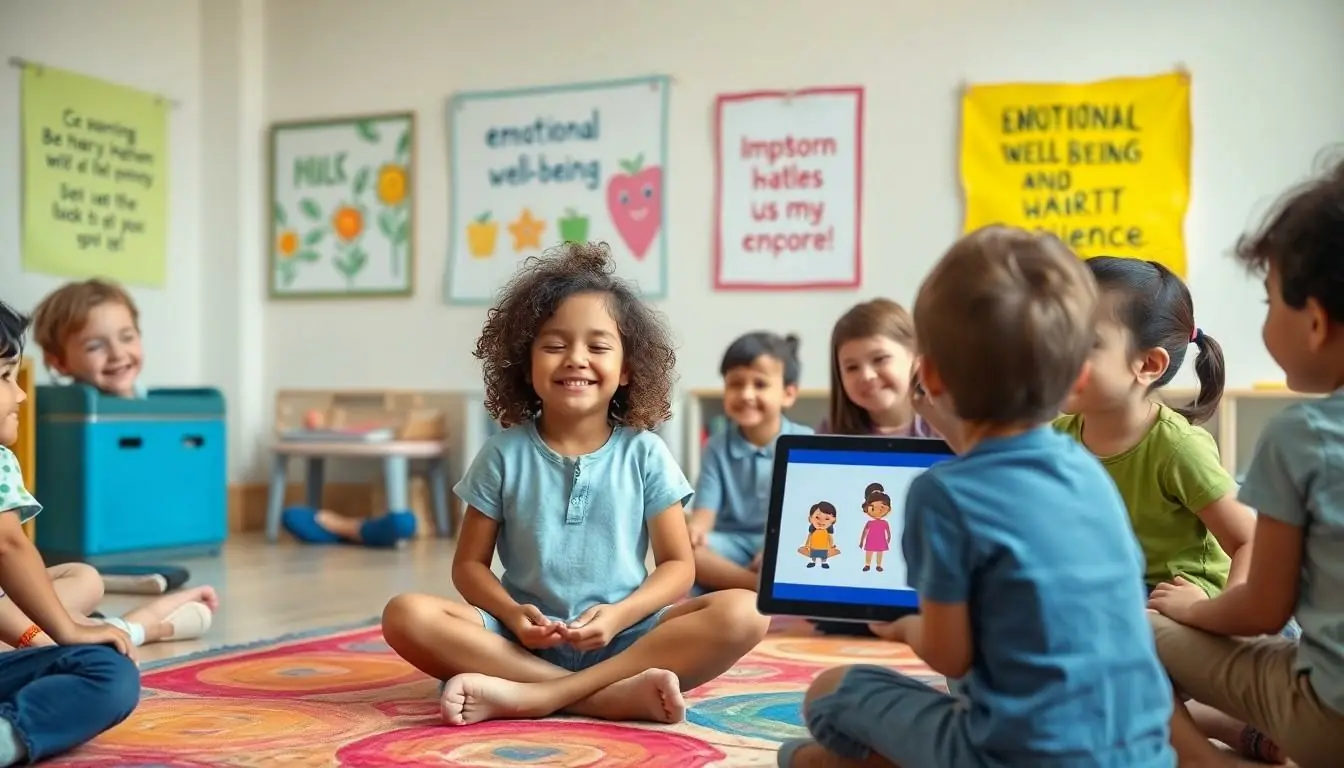In a world where kids are juggling school, social media, and the occasional existential crisis, mental health startups are stepping in like superheroes in capes—only these capes are made of mindfulness and emotional support. With a sprinkle of innovation and a dash of creativity, these startups are transforming the way children approach their mental well-being.
Table of Contents
ToggleOverview of Mental Health Startups for Kids
Numerous mental health startups are addressing the unique needs of children. These companies focus on fostering resilience and promoting emotional well-being. Offering apps and platforms, they provide tools for kids to learn coping mechanisms and emotional regulation. Many utilize gamification to engage users, making mental health practices accessible and appealing for younger audiences.
Startups like Calm, specifically tailored for kids, deliver mindfulness exercises through interactive storytelling. Another example, Headspace for Kids, ensures that age-appropriate techniques are incorporated into sessions, promoting relaxation and focus. Companies such as Woebot utilize AI technology, enabling children to converse with virtual companions that provide support and guidance based on cognitive-behavioral therapy principles.
Additionally, organizations conduct workshops and group sessions, encouraging social interaction and peer support. Initiatives like Big Life Journal offer resources and guidance in cultivating a growth mindset while addressing the importance of mental health discussions among children.
Backing from educational institutions can significantly enhance the effectiveness of these startups. Collaborations with schools allow for wider outreach, ensuring that mental health resources reach children in diverse settings. Many of these startups focus on inclusivity, reaching underrepresented communities and providing resources that cater to cultural sensitivities.
Investments in mental health startups for kids are rising, reflecting a growing awareness of the importance of early interventions. As awareness increases, these organizations contribute significantly to creating a supportive ecosystem that fosters the mental well-being of children.
Importance of Mental Health in Childhood

Mental health plays a crucial role in a child’s overall development. Addressing emotional well-being during early years fosters resilience and adaptability.
Impact on Development
Emotional stability influences cognitive development in children. Children with strong mental health often exhibit improved focus and academic performance. Furthermore, emotional well-being enhances social skills, allowing kids to form meaningful relationships. They also adapt better to life’s challenges, leading to lower risks of anxiety and depression later on. Mental health support provides tools for emotional regulation, enabling children to navigate stressful situations effectively.
Long-term Benefits
Investing in mental health during childhood leads to lasting effects in adulthood. Studies show that children receiving early mental health interventions demonstrate higher success in education and career. They also report lower rates of mental health disorders as adults. Improved emotional intelligence cultivates healthier relationships and communication skills throughout life. Additionally, fostering a positive mindset in childhood promotes lifelong coping strategies, ensuring better mental health in later years.
Notable Mental Health Startups
Several mental health startups emerge as key players in supporting children’s emotional well-being. Each focuses on unique aspects of mental health, addressing various needs and challenges.
Startup 1: Calm Kids
Calm Kids targets mindfulness through engaging storytelling. This platform uses interactive tales to teach children relaxation techniques and coping skills. By merging entertainment with mental health practices, it captivates young audiences. Numerous resources foster emotional regulation, making it a valuable choice for parents seeking improved mental well-being in their children.
Startup 2: Headspace for Kids
Headspace for Kids offers age-appropriate meditation practices. This startup breaks down mindfulness into easy-to-understand modules tailored for children. Diverse techniques and playful animations help children develop focus and reduce anxiety. Emphasizing short meditation sessions, it encourages daily practice, integrating mental health into a child’s routine effectively.
Startup 3: Woebot
Woebot, utilizing AI technology, provides personal support through a virtual companion. This friendly chatbot engages children using cognitive-behavioral therapy principles. Woebot encourages users to express feelings and practice coping mechanisms. Accessible via smartphones, it ensures that children receive support anytime they need it, promoting ongoing mental health conversations.
Innovative Approaches to Mental Health
Various mental health startups employ creative methodologies to enhance children’s emotional well-being. They leverage the latest technologies and community-driven initiatives to engage young audiences effectively.
Technology Integration
Innovative startups embrace technology to facilitate mental health. Apps offer interactive experiences that teach coping strategies and emotional regulation. Woebot uses AI to deliver personalized support, enabling kids to express feelings and learn coping mechanisms in a friendly environment. Calm Kids integrates mindfulness practices via storytelling, helping children develop relaxation skills through engaging narratives. Headspace for Kids provides interactive meditation exercises designed specifically for younger users, incorporating playful animations. Each platform focuses on making mental health practices engaging and accessible, which significantly reduces barriers for children seeking support.
Community Engagement
Community involvement plays a pivotal role in these startups’ operations. Programs often include workshops that foster peer support and social interaction, allowing children to share experiences and learn from one another. Initiatives like Big Life Journal encourage discussions around mental health, promoting openness about emotions among kids. Collaboration with schools ensures wider outreach, making resources available to underrepresented communities. By forming partnerships with educational institutions, startups amplify their impact, helping children to build resilience and improve emotional well-being within a supportive network.
Challenges and Considerations
Mental health startups for kids face unique challenges and considerations in the marketplace. Addressing these factors ensures effective support for young users while maximizing outreach.
Accessibility Issues
Accessibility remains a key concern for mental health startups targeting children. Many children lack access to smartphones or reliable internet connections, hindering their ability to utilize these apps. Additionally, some platforms may not cater to children with disabilities or diverse learning needs, limiting their effectiveness. Solutions that ensure inclusivity include designing apps with various accessibility features and offering offline resources. Engaging partnerships with schools can also bridge the gap, making mental health resources available to all children, regardless of their socioeconomic background.
Parental Involvement
Parental involvement proves crucial in the success of mental health initiatives. Parents must understand the importance of mental well-being and feel comfortable utilizing these resources. Workshops and informational sessions can empower parents to support their children’s mental health journey effectively. Moreover, features that allow parents to monitor their children’s progress on these platforms foster a sense of security and encourage engagement. Building trust between parents and startups strengthens the overall impact, creating a comprehensive support system for children’s emotional development.
Mental health startups for kids are transforming the landscape of emotional support and well-being. By leveraging technology and innovative approaches these companies create engaging platforms that resonate with younger audiences. They not only teach essential coping strategies but also foster resilience in children facing various challenges.
The collaboration with educational institutions and community programs amplifies their reach ensuring that all children have access to these vital resources. As awareness grows regarding the importance of mental health in childhood development the impact of these startups will likely expand. Investing in mental health during formative years lays the groundwork for a healthier future reducing the risk of anxiety and depression later in life.



